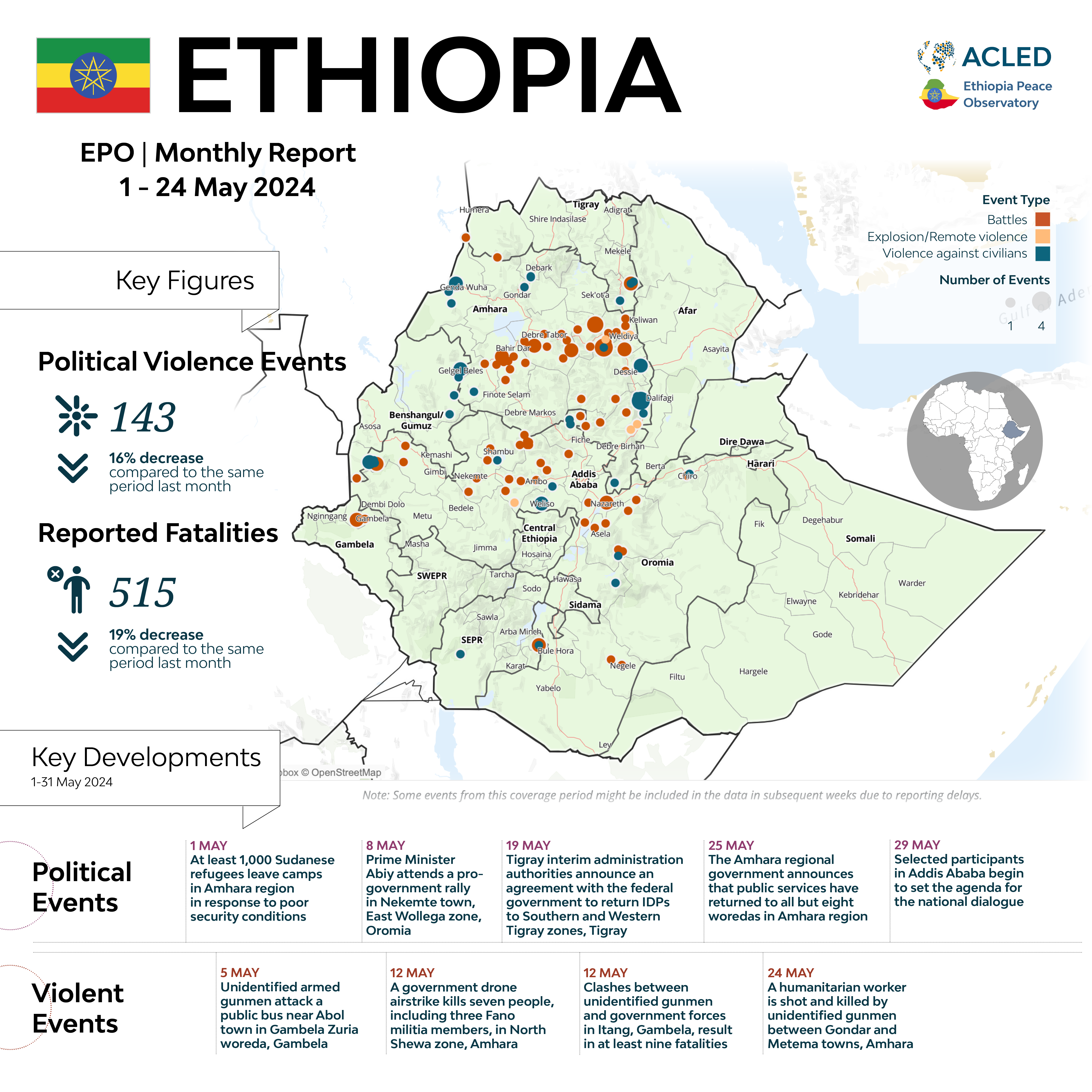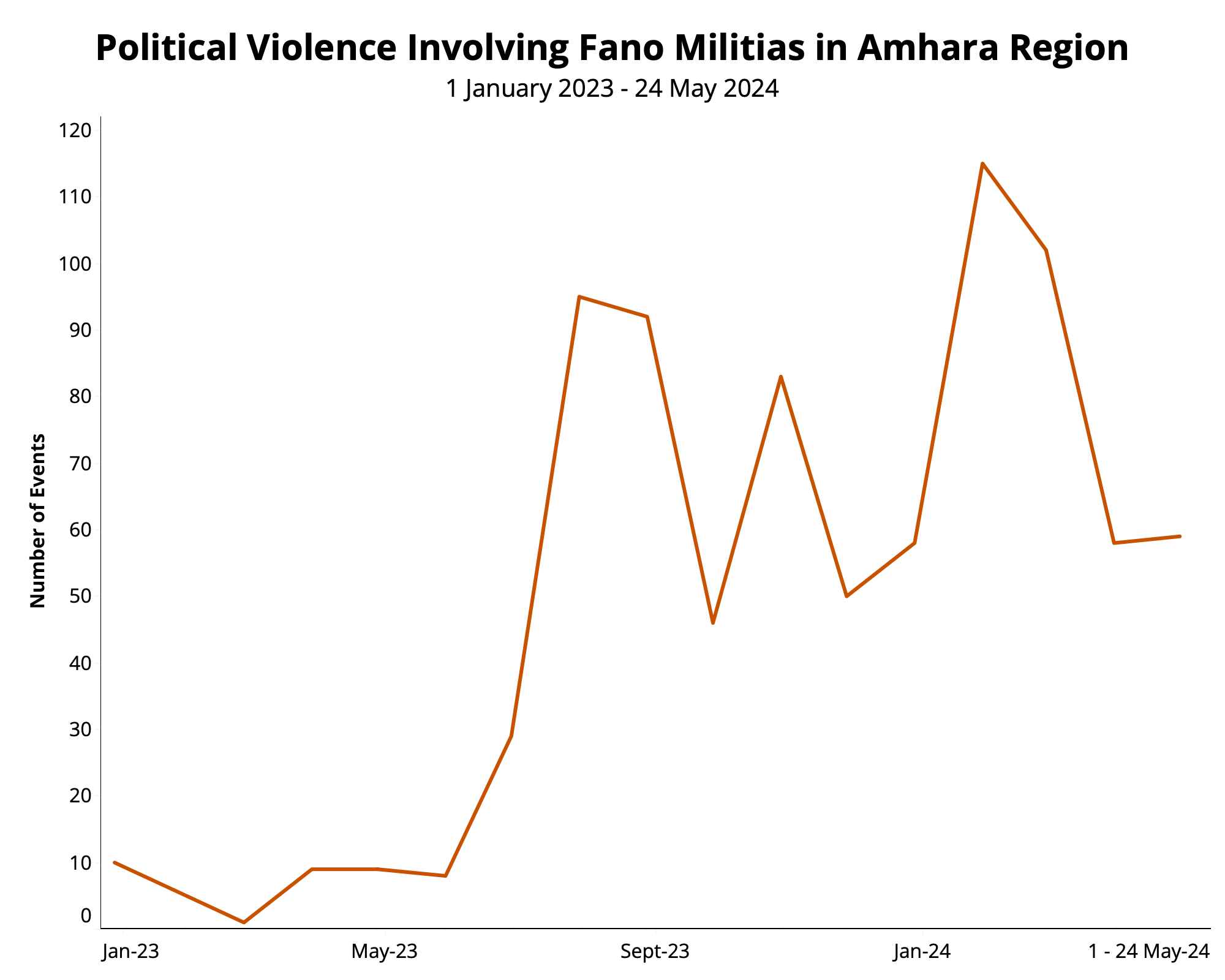EPO Monthly Update | May 2024
Ethiopia’s national dialogue faces high expectations and criticism
May at a Glance1ACLED data updates are paused for four weeks starting from 25 May. Data covering the period of 25 May to 21 June will be released starting on 24 June, after which regular data and publication updates will resume. Hence, the data in this report cover the period from 1 to 24 May 2024.
Vital Trends
- From 1 to 24 May, ACLED records 143 political violence events and 515 reported fatalities in Ethiopia.
- Battles and violence against civilians were the two most common event types from 1 to 24 May, with 96 and 41 events, respectively. Most of these events were linked with the ongoing conflict between government and insurgent forces in the Amhara and Oromia regions.
- From 1 to 24 May, ACLED records the most political violence — 71 events and 230 reported fatalities — in Amhara region, followed by Oromia region, with 52 events and 238 reported fatalities.

Ethiopia’s national dialogue faces high expectations and criticism
Ethiopia’s national dialogue has been the subject of hope for many who are invested in the country’s future. A broad array of actors in the country agree that a dialogue between those with opposing political views is necessary to solve the complex issues facing Ethiopian society. Despite this consensus, its implementation has been fraught with issues, with opposition parties and anti-government groups accusing the government of dominating the process and, therefore, nullifying its legitimacy. Armed groups, including Fano militias and the Oromo Liberation Army (OLA) — referred to by the government as the Oromo Liberation Front (OLF)-Shane — have been invited to participate but have refused based on accusations that the government unfairly owns the process.2VOA Amharic, ‘The Oromo Liberation Army and the Amhara Fano said, “We have not been called for peace,”’ 8 May 2024 Many in Ethiopia and in communities abroad have denounced the upcoming dialogue as little more than a government charade designed to placate domestic unrest and please international backers.3Amhara Association of America, ‘Joint statement by international Amhara civic organizations on the sham national dialogue process undertaken by the Abiy regime in Ethiopia,’ 30 April 2024 Still, there are positive and negative possible outcomes to a national dialogue process — even one dominated by the government — that should be considered. Potential outcomes include a greater consensus among government-aligned elites, solutions to Ethiopia’s smallest conflicts, and a widening of the gap between the government-aligned actors and those involved in anti-government insurgencies.
Progress in the national dialogue process
On 29 December 2021, Ethiopia’s House of Peoples’ Representatives adopted a proclamation establishing the Ethiopian National Dialogue Commission, which will be tasked with facilitating discussions among political and social groups to build consensus on key national issues. While the idea of the national dialogue is universally agreeable to Ethiopia’s many civil societies, its implementation has been anything but smooth. At the inception of the Dialogue Commission, 13 representatives voted against its formation, arguing that the timing was not right due to the ongoing conflict in northern Ethiopia and in Oromia region.4House of People’s Representatives of FDRE, ‘House promulgates National Dialogue Commission establishment proclamation,’ 29 December 2021 In February 2022, as the dialogue commissioners were being selected, the Ethiopian Political Parties Joint Council — a coalition of more than 50 registered political parties in Ethiopia — issued a statement requesting that the House of Peoples’ Representatives halt the selection process, claiming it lacked inclusiveness and trust.5Ethiopian Political Parties Joint Council, ‘A statement regarding the preparation process of the national Dialogue,’ 17 February 2022 Most disappointing for stakeholders has been that key armed factions in the country, including Fano militias and OLA/OLF-Shane, have either been excluded or refused to participate. As a critic noted in Foreign Policy, a process that “commences by excluding critical actors or is stage-managed by the ruling elites cannot lead to sustainable peace.”6Awol Allo, ‘Ethiopia’s National Dialogue Needs to Include Everyone,’ Foreign Policy, 29 December 2021
Thus far, the National Dialogue Commission has conducted participation selection activities in 10 regions and two city administrations.7Addis Standard, ‘News: Caucus of Opposition Parties accuses National Dialogue Commission of ‘political bias’ and ‘failure to ensure inclusivity,’ 23 May 202 The commission is working with authorities in Tigray region to start the process there but has been delayed due to the effects of the northern Ethiopia conflict.8Iliyas Kifle, ‘We are waiting for Tigray interim government’s response- National Dialogue Commission,’ Addis Maleda, 12 February 2024; Sisay Sehlu, ‘The National Consultative Commission announced plans to go to the Tigray region,’ The Reporter, 24 August 2022 Likewise, the process was delayed in Amhara region due to the ongoing armed clashes between Fano militias and government forces that started in April 2023 (see graph below), though it is expected to begin soon.9Tesfalem Woldiyas, ‘It was announced that the number of districts that have elected representatives to give agenda ideas for the national consultation has reached 327,’ Ethiopian Insider, 22 December 2023; Fana Broadcasting, ‘National dialogue at final chapter of agenda gathering: Commissioner,’ 28 May 2024 Following the selection process, the commission will choose topic agendas, a process that began in Addis Ababa on 29 May.10Nahom Ayele, ‘Stakeholder representatives who represented Addis Ababa at the national dialogue submitted dialogue agendas to the Commission,’ Ethiopian Insider, 4 June 2024; Fana Broadcasting, ‘National dialogue at final chapter of agenda gathering: Commissioner,’ 28 May 2024

As the National Dialogue Commission moves into the preparation phase in Amhara region, where it plans to engage over 200 towns, its detractors have dismissed it as little more than a government charade.11Sisay Mulu, ‘National Dialogue or National Monologue? Abiy Ahmed’s One-Man Show,’ Borkena, 7 May 2024 Criticism of the national dialogue is well-placed. The government under Prime Minister Abiy Ahmed has repeatedly proven to be willing to violently repress opposition voices through violence.12Giulia ParaviciniI, ‘A Reuters investigation in Ethiopia, a secret committee orders killings and arrests to crush rebels,’ Reuters, 23 February 2024 It has indicated that it would engage in peace talks, but has not been willing to take a step back and address accusations that it is overly involved in the governance of the dialogue, nor has it indicated that it is willing to release political prisoners for the sake of the dialogue. A dialogue dominated by a repressive government will not be able to find satisfactory solutions to Ethiopia’s constitutional problems, nor does it have the capacity to address demands by anti-government insurgencies like Fano or OLA/OLF-Shane, or the Tigray People’s Liberation Front (TPLF). Equally problematic is the fact that the Fano and the OLA/OLF-Shane have made it clear that they will not participate unless a transitional government is established first.13Amhara Association of America, ‘Joint statement by international #Amhara civic organizations on the sham national dialogue process undertaken by the Abiy regime in Ethiopia,’ 30 April 2024; Ermias Tesfaye, ‘Oromia peace prospects dimmed by renewed fighting,’ Ethiopia Insight, 24 May 2023 Despite its very obvious flaws, there are some key potential outcomes to the national dialogue that should not be overlooked, including consensus-building among elites and resolving small, local, and cross-border conflicts.
Consensus-building among Ethiopia’s elites
The national dialogue provides an opportunity for the government to map its elite support networks nationwide, just as it was able to do through the national election. Like the election, the national dialogue is also a chance for Abiy to widen the depth and breadth of the Prosperity Party’s influence in the participating regions, which are already more numerous than those that participated in the national election as most of Benshangul/Gumuz region will be participating.14Most of Benshangul/Gumuz region did not participate in the national election due to ongoing insecurity. This insecurity has since improved. See the EPO Monthly: March 2024. The government’s investment into the process demonstrates its commitment to holding the dialogue — albeit not for entirely altruistic reasons.
The Prosperity Party’s membership inherited most of its base from the former Ethiopian People’s Revolutionary Democratic Front but is often described as chaotic at lower levels as officials are chosen for loyalty to Abiy rather than on merit.15Ashenafi Endale, ‘PP’s probe into uncharted ideological territory,’ The Reporter, 13 August 2022 Poor governance is a result, and regional parties have competed with one another.16 Africa Intelligence, ‘Inner circles | Ethiopia Abiy’s Prosperity Party destabilized by regionalist tensions,’ 23 April 2024 The national dialogue has the potential to solve some of these issues through consensus building, working through organizational issues within the Prosperity Party, and networking among local elites who are both members and nonmembers of the ruling government party. This, in turn, could result in an improvement in local security and a reduction in conflicts between communities. The exception is Tigray region, where the dialogue is delayed and where the Prosperity Party does not exist.
Solving Ethiopia’s small, local, and cross-border conflicts
A greater national consensus among Ethiopia’s elites could have a large impact on Ethiopia’s small, local, and cross-border conflicts. Ethiopia’s periphery conflicts have recently reached an all-time low — a critical juncture for which sustainable peace solutions could be drafted during the national dialogue process. Among these conflicts is the Afar-Somali border conflict, which saw a temporary resurgence in fighting during the last week of April. Benshangul/Gumuz region — also temporarily peaceful but with indications that violence could re-emerge — is another location where the national dialogue is likely to have a significant impact on peace and security. In Benshangul/Gumuz region, former rebel groups have been incorporated into the government and civil institutions and will certainly be participating in the dialogue.17VOA Amharic, ‘It was reported that there was damage to life and property due to an attack allegedly carried out by militants in Dabate district,’ 10 May 2024 Additional locations — many in the former Southern Nations, Nationalities and Peoples region — could be positively influenced by a national dialogue process.
A word of caution
As with the national election, there is little expectation among stakeholders that the national dialogue process will solve Ethiopia’s largest issues. Conflict in Raya and Welkait, the Fano insurgency, and the OLA/OLF-Shane insurgency will not be influenced by the national dialogue as the armed groups involved are not likely to participate. Without these factions participating, Ethiopia’s constitution, the future of ethnic federalism, and justice for victims of recent conflicts will likely be discussed, but any conclusions will be unilateral and likely in favor of the government’s agenda. This movement risks widening the gap between those participating in insurgencies and the government’s supporters rather than bringing the country closer together on national issues.





